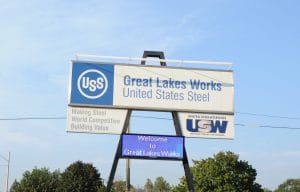Despite a promise from the Trump administration that tariffs would protects jobs in the steel industry, a plant that made steel for automakers and as well as dozens of suppliers around Detroit will shutter a significant part of its operations and idle more than 1,500 employees, most of them permanently.
The lift that tariffs offered steel makers, however, was not enough to offset the drag from older plants owned by United States Steel Corp. that were trying to compete with rivals in the United States with newer, more modern and more productive facilities.
With major spending commitments at its Gary Works facility just outside Chicago and at Mon Valley outside Pittsburgh, U.S. Steel elected to shut down significant portions of the Great Lakes Works in River Rouge, Michigan, just outside of Detroit.
(Tesla gets tariff exemption from Commerce Department)
Domestic steel prices, after rising in the immediate aftermath of tariffs imposed on steel imports, have fallen amid weakening demand from the auto and other manufacturing sectors.
Steel production at Great Lakes Works will stop around April 1, and the hot-strip mill rolling facility will cease operations before the end of next year, U.S. Steel said in a statement. Production will be shifted to Gary Works outside Chicago, the statement added.
The layoffs will bring pink slips to 94% of the workforce at Great Lakes mill, which primarily serves the automotive industry throughout the Detroit area.
(U.S. ending steel, aluminum tariffs on Mexico, Canada)
U.S. Steel’s new strategy to ramp up investments at three mills in North America – Mon Valley plant in Pennsylvania, Gary Works in Indiana and Big River Steel in Arkansas, which the company expects to fully acquire within the next four years – threw the future of the Michigan plant into doubt.

President Donald Trump tariffs were designed to protect U.S. steel companies, but U.S Steel is closing its Michigan plant.
Prices of hot-rolled coil are down 41% from their 2018 peak, hurting the profits of American steel companies. U.S. Steel, which saw a record profit in 2018 on soaring steel prices, reported a loss in the latest quarter on slowing demand.
U.S. Commerce Secretary Wilbur Ross defended the tariffs, claiming the closure of Great Lakes Works did not mean steel import tariffs failed. Instead, he offered that plant is being closed because it is too expensive to run.
(China Doesn’t Pull Punches, Implements $75B in Tariffs)
“What is happening is they are rationalizing a bit their production so that they will be more competitive in the future as we continue to go forward,” he said during an interview on Bloomberg Television.



Zug Island had a reach history in the area, sorry to see it go.